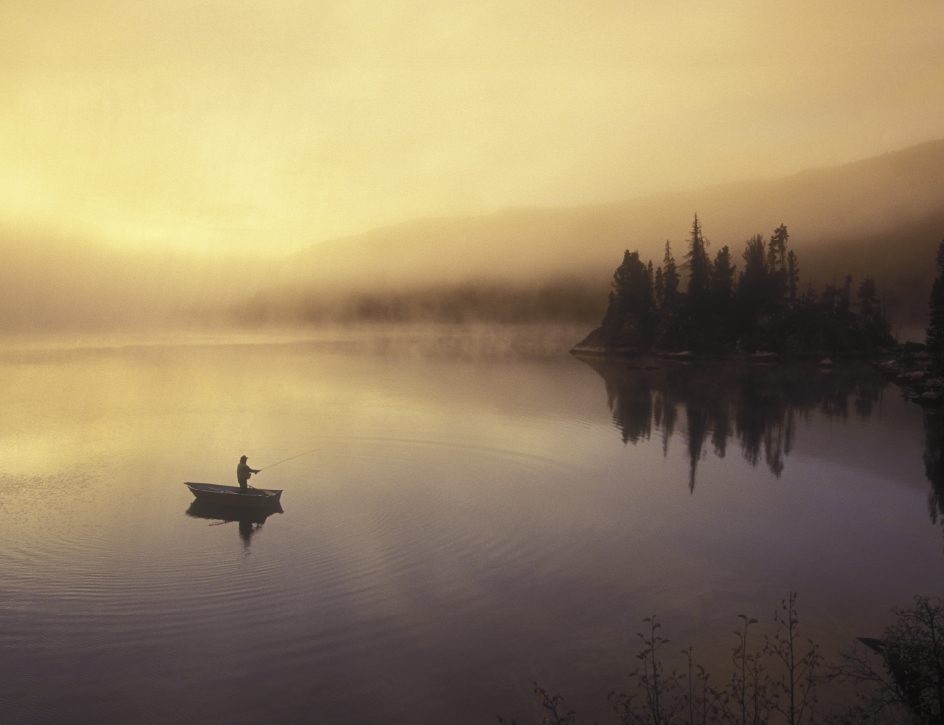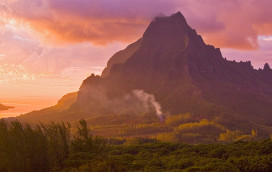Have you ever seen a leopard? A giant sloth? A tiger? How about a manta ray or a great white shark? Ever experienced a humpback whale breaching so close that it rocked the boat? Or had your toothpaste stolen by monkeys? I’m not talking about watching those sad-eyed animals that pad endlessly around their cages in zoos, or joining dozens of others on a whale-watching boat. I’ve been lucky enough to see all these creatures up close and personal (in certain cases, a little too close). But I’ve seen them because I go fishing.
Why go fishing anyway? Research suggests that more than two-thirds do so to get away from it all. In our increasingly stressful lives, it becomes harder and harder to seek escape. Fishing doesn’t take place in cities, with honking cars and constantly ringing cellphones. It’s best enjoyed in the world’s wilder and less exploited places. Peace within peace.
Fishing, you see, is about much more than outwitting a creature with the brain power of a sliced loaf (although you’ll notice that anglers like to attribute superhuman intelligence to their quarry). Angling can be solitary and contemplative; it can break your heart or make it soar like an eagle. It can be restful or exhausting, aesthetic, poetic or scientific. Best of all, you can choose. And as I get older (if none the wiser), I’m not even sure that catching fish is actually the point of it all.
I was fishing on a nearby lake when a kingfisher chose the end of my rod as a convenient resting place to gulp down the minnow it had just caught. There it sat, this glorious iridescent-blue bird, just feet from me. I can’t remember what I caught that day, but I’ll always recall that kingfisher, ignoring me and concentrating on lunch. Because I sat there quietly, it took me as part of its world. I’d become part of nature rather than an intrusion.
Would I ever have seen that leopard, gliding ghost-like across a ridge at dusk, if I hadn’t been in the Indian jungle fishing for mahseer? Would I have seen that sloth moving in slow motion through treetops in Guyana unless I had traveled to South America hoping to catch an arapaima, the fish I had read about in David Attenborough’s 1956 Zoo Quest to Guiana, and dreamed for 40 years of seeing?
Earlier this year, I was fishing in Norway’s Lofoten Islands (a great place to watch the Northern Lights). A group of us were after halibut and giant cod, but we stopped fishing when a pod of killer whales with young came within feet of our little boat. We followed them for miles, marveling at their grace. And what about that time in Belize, when our family spent a couple of hours spotting manatee, then saw a whale shark swim ponderously past the hotel jetty as a bonus? Or that holiday to Puerto Rico, where a pelican came into the pool at 5pm every day, and the staff fed it with fish? That was the trip where, on Christmas Day, I dangled a line off a jetty, attracting children of several nationalities, who took it in turns to catch the dazzling multi-colored, Rothko-esque fish that swarmed at our feet. Surrounded by these excited youngsters, some no older than three or four years old, I felt like the Pied Piper of Hamelin. That they didn’t speak English didn’t matter – we found a universal language of joy.
For me, a fishing trip anywhere in the world – whether it’s Langkawi, Vancouver or the Maldives – is my way of experiencing things that most people see only in nature films. The American author John Gierach put it far better than I can. He was once asked, “How was the fishing?” and replied, “The fishing was wonderful. The catching wasn’t up to much, though.”
You may be reading this in one of St. Regis’s elegant resorts, perhaps in Shenzhen, Bora Bora or Puerto Rico. You’re probably gazing out to sea, wondering what to do besides sipping mojitos and putting on more sunscreen. Why not go fishing, and see at first-hand the wonders of nature? We’ve just returned from Costa Rica where, on a half-day fishing trip off the Pacific coast, we were entertained by dolphins, saw shoals of migrating stingrays jumping from the water, manta rays sunning themselves and a huge leatherback turtle drifting on the current. As my wife poetically put it, “And most people think the sea is just a big, empty mass of water.”
This makes it sound as if I spend all my time fishing, to the exclusion of everything else. Wishful thinking, but sadly untrue. Family holidays need to be just that – although, if there’s water nearby, I’m always peering into it, wondering what lurks beneath the surface. There’s usually a local boat you can hire for a day, and in more sophisticated resorts you’ll find sleek vessels that will transport you to areas where the fish are big and hungry.
If you happen to be staying at one of the St. Regis resorts in southern China, your hotel can set up a trip through Simpson Marine, which runs two boats year-round.
The Thai Lady is ideal for a group of four friends, while Fortuna can accommodate up to 30. The crews are vastly experienced and in these waters you’re likely to catch anything from yellowfin tuna and snapper to sailfish and black marlin.
It doesn’t matter if you don’t know which end to hold a rod. Fishing really isn’t difficult – it’s only fishermen that try to make it so. You can go out to sea with a $1,000 space-age reel and a box full of colorful lures in all shapes and sizes (fishing, after all, has more accessories than the others sports put together), but the person next to you – who could be your 10-year-old grandson or a 75-year-old novice – may still catch the big fish, using tackle supplied by the boat.
Worried about seasickness? Buy a Relief Band, a watch-like device that truly works. It generates electric signals (actually, small shocks) that, once transmitted to the body, convince your brain that all is steady. Strap it on to your wrist, set the dial and, suddenly, a rocking boat holds no fears. Mal de mer used to wreck my Hemingway dreams – there’s nothing worse when you’re eager to tangle with ocean giants like marlin, shark and tuna. The moment the horizon started to move, so did my stomach. Not any more.
When people ask my greatest memory, I recall a day in Outer Mongolia, hundreds of miles from anywhere. I was relaxing on the riverbank, feeling content after catching two taimen, the very rare salmon that were the primary focus of our trip. A bright yellow sun rested in a flawless blue sky, as if the whole scene had been painted by a child using a palette of primary colors. In the distance, snow covered the hills. Then a group of herders, who had lived the same way for hundreds of years, crossed the river. It was an achingly beautiful scene and I thought: “It doesn't get more wonderful that this. OK, God, take me now.” Thank goodness He wasn’t listening.
Your address: The St. Regis Bahia Beach Resort, Puerto Rico; The St. Regis Bora Bora Resort; The St. Regis Macao, Cotai Central; The St. Regis Sanya Yalong Bay Resort; The St. Regis Shenzhen; The St. Regis Langkawi; The St. Regis Maldives Vommuli Resort



